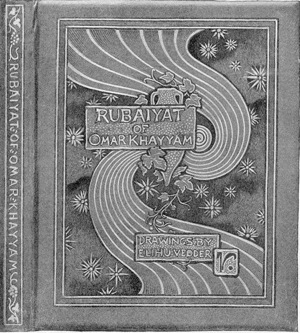In bookstores there are sections for African-American literature, books in Spanish, a GLBT section, and a number of other subdivisions. In the bookstore in my head, there’s a Mutt Lit area.
I’m an American of Welsh, Serbian and Lebanese ancestry, with a German last name. For a long time I felt like I had no ethnicity, but I’ve decided that isn’t true. I’m a Mutt! My people are from Foreignoslavia. Or maybe Mictogenetistan. We are a proud, brownish people. As a result of fully accepting my heritage-in-a-blender, I’ve found myself drawn to cultural mash-ups.
The collaboration of Edward FitzGerald and Omar Khayyam is a good example. The Rubaiyat, in English, belongs to two authors, two cultures, two times and we hear it in one voice. No question, FitzGerald went well past translation in his take on the poem. A quick comparison of literal translation with his shows a pretty deep re-write. Take a look at these two versions. One is from a contemporary Persian translator and the other is FitzGerald. Any question as to which is which?
In spring if a houri-like sweetheart
Gives me a cup of wine on the edge of a green cornfield,
Though to the vulgar this would be blasphemy,
If I mentioned any other Paradise, I’d be worse than a dog.
Here with a Loaf of Bread beneath the Bough,
A Flask of Wine, a Book of Verse – and Thou
Beside me singing in the Wilderness –
And Wilderness is Paradise enow
While some would scold FitzGerald for his liberality, I applaud the mixing of East and West. It’s not a translation. It’s nothing like one. It’s a remix. In his essay “The Enigma of Edward FitzGerald” Borges writes: “All collaboration is mysterious. That of the Englishman and the Persian was even more so, for the two were quite different, and in life might not have been friends; death and vicissitudes and time led one to know the other and make them into a single poet.” What a beautiful and improbable merging. The Rubaiyat is a mutt poem of the purest pedigree. I see it as the anthem of Foreignoslavia (and should be performed by Dick Dale).

Other cultural hybrids in literature, film and music are numerous. Just a few off the top of my head: The Decameron, the strange and marvelous lovechild of Shahrazad and the plague. Invisible Cities, Italo Calvino’s Sino-Venetian tale of perspective multiplicity. Haroun and the Sea of Stories, by Salman Rushdie, an author who cites the film version of the Wizard of Oz as his earliest literary influence. Not to mention just about everything by Haruki Murakami, who is more Vonnegut than Mishima, more Kafka than Kawabata.

If you see what I’m getting at, it isn’t necessarily the works of multiethnic authors that I’m talking about so much as stories that are, in and of themselves, points of cultural interaction.
Contrast this to, say, The Three Musketeers. Dumas may have been a mutt but his novel wasn’t. No offense intended; it’s a great book. It’s just not a cultural mixtape like the other works I mentioned. It’s pure French through and through.
Some stories try and fail to mix cultures. Though I hate to admit it, because I’m a big fan of the show, I’d place Firefly in this category. The concept is, in theory, a mixture of American and Chinese cultures. In reality, the Chinese aspect is all but missing. But for the occasional mumbled Mandarin word, the show opted for a post-civil war era motif throughout. Asian thought, customs and art are absent or presented lazily.
Then there’s David Windgrove’s Chung Kuo series. The Chinese aspect of the story is, of course, massively important and far more thoroughly imagined than in Firefly. But still, the novels don’t work for me as instances of cultural merging so much as European versus Chinese, with the Chinese in the adversarial position. It’s little different from novels in which an alien race has taken over earth. In Wingrove’s books, the aliens are from China.
I’m not saying, in any way, that in a book in which two cultures meet, they have to play nice. This isn’t a case of multicultural naiveté; conflict is a perfectly valid avenue to explore. All I’m saying is that an authentic melding can create some pretty wonderful results.
And authenticity is a major part of all this. Intentional, specifically planned cultural mixture in art (as with my Firefly example) seldom creates the same great resonance as art in which cultures flow into each other. In a way, what I’m calling “Mutt Lit” is like a really great kiss. The best kisses, as we all know, are inevitable. They’re natural and thrilling, a unique encounter of elements attracted by undeniable force.











